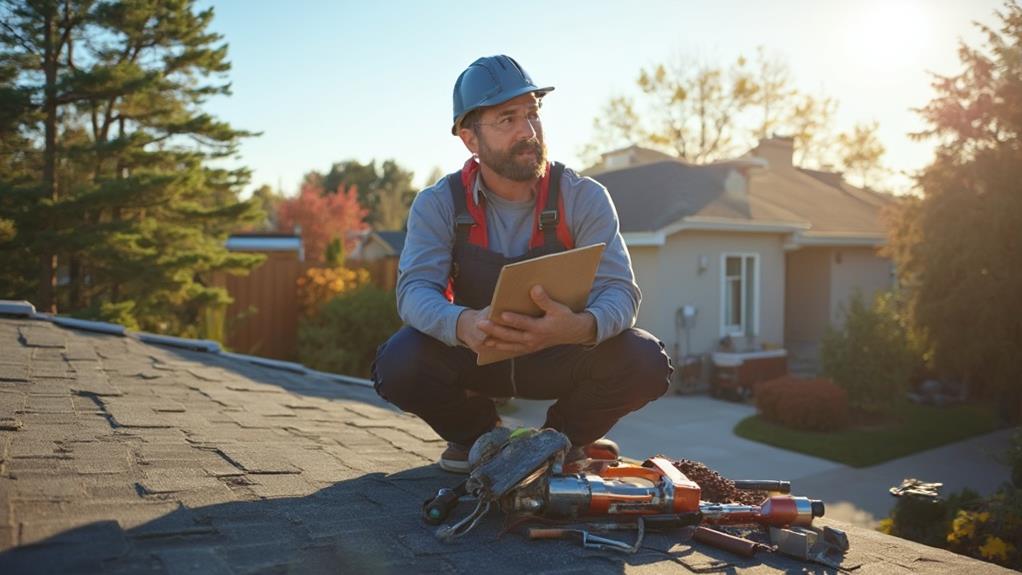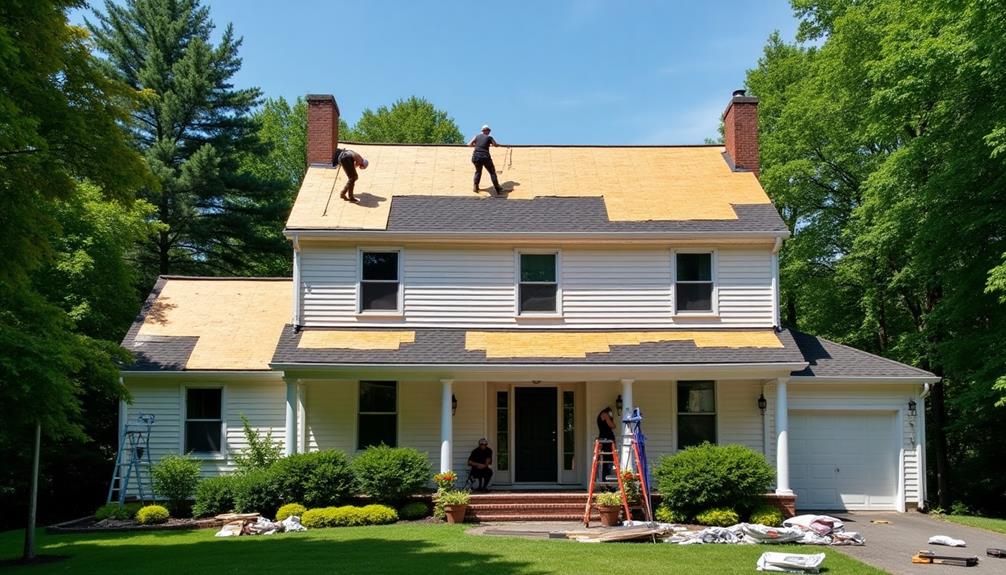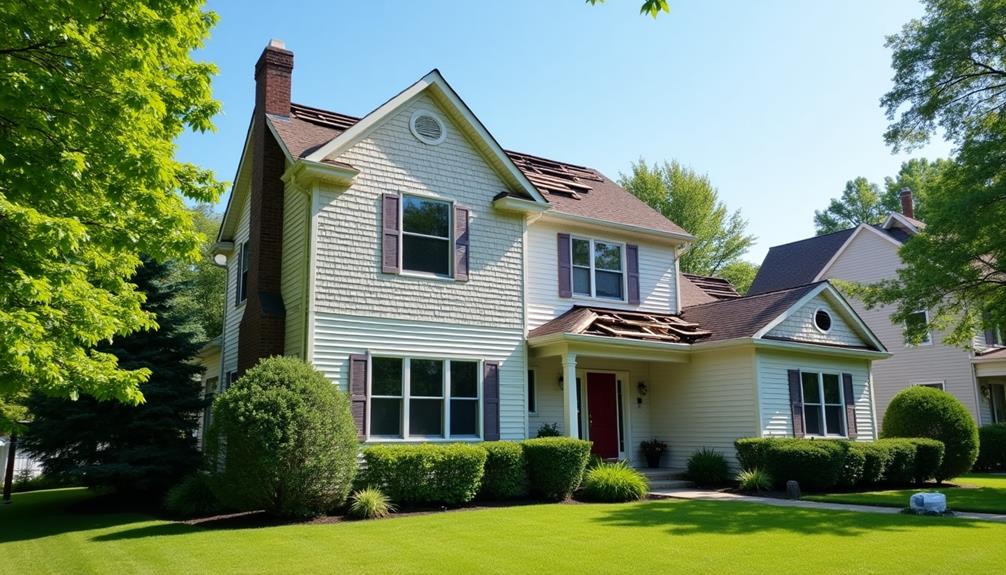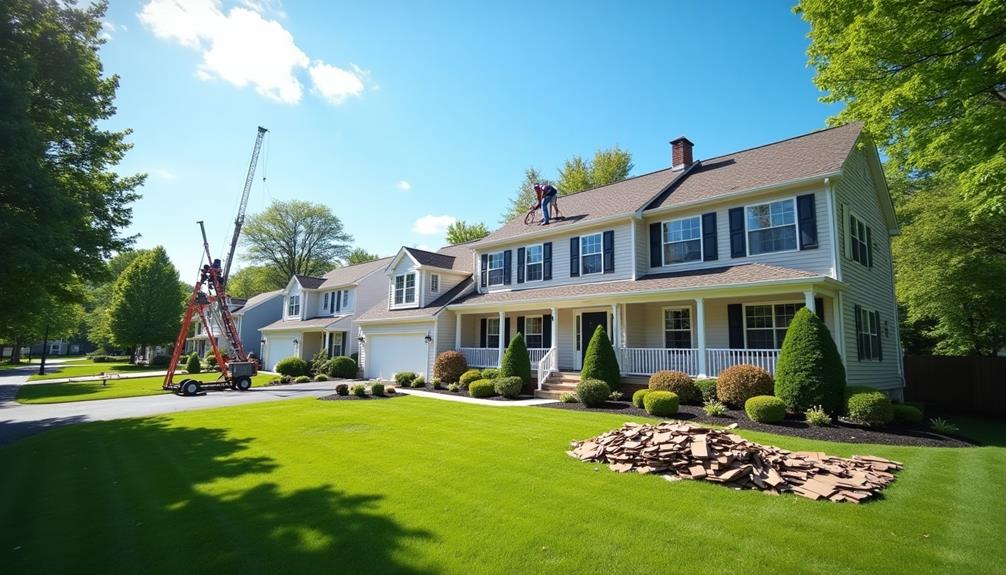When you're faced with the decision of hiring a roofing contractor, it's crucial to ensure you're making a choice you can trust. Start by verifying their credentials and experience, and don't overlook the importance of customer reviews and recommendations. Once you've narrowed down your options, request detailed estimates and check their insurance and warranties. This process might seem straightforward, but there are nuances that can make a significant difference in the outcome of your project. So, what should you prioritize to avoid costly mistakes?
Verify Credentials and Licensing
When choosing a roofing contractor, you should always verify their credentials and licensing to ensure you're making a sound investment. Start by checking the contractor qualifications, as this is vital for determining their ability to perform the work successfully. A reputable contractor will possess the necessary training, certifications, and affiliations with industry organizations.
Next, familiarize yourself with the licensing requirements in your area. Each state or region may have specific laws governing roofing contractors, including necessary licenses and insurance coverage. Ensure that the contractor you're considering holds the appropriate licenses to operate legally within your jurisdiction. This not only protects you but also indicates that the contractor is committed to adhering to local regulations and standards.
Additionally, request documentation to confirm their licensing status. You can typically verify this information through local governmental offices or online databases.
Assess Experience and Expertise
Assessing a contractor's experience and expertise is crucial to ensuring your roofing project is executed efficiently and effectively.
When it comes to roofing, you want someone who understands the nuances of different roofing materials and can manage project timelines adeptly.
Here are three key factors to consider:
- Years in Business: A contractor with significant experience is likely to have honed their skills and built a reputation for quality work. Look for someone who's been in the industry for several years.
- Specialization: Roofing is a specialized field. Ensure the contractor has experience with the specific roofing materials you're considering. This knowledge can directly impact the longevity and durability of your roof.
- Successful Projects: Ask for examples of completed projects similar to yours. A contractor should be able to share a portfolio that demonstrates their expertise and craftsmanship in handling various roofing styles and materials.
Read Customer Reviews
When selecting a roofing contractor, analyzing online ratings is crucial for understanding their reputation.
Don't overlook personal recommendations, as they can provide insights that ratings alone might miss.
Analyze Online Ratings
Analyzing online ratings and reading customer reviews is essential for making an informed choice about a roofing contractor. Your contractor's online reputation can significantly influence your decision, so it's crucial to evaluate it carefully on various rating platforms.
Here are three key aspects to consider:
- Overall Rating: Look for a contractor with a high overall rating. A score of 4.0 stars or above is generally a positive indicator of quality service.
- Recent Reviews: Focus on the most recent reviews. A contractor may have had a good reputation in the past, but changes in management or practices can affect current service levels.
- Response to Feedback: Pay attention to how the contractor responds to both positive and negative reviews. A professional response to criticism shows accountability and a commitment to customer satisfaction.
Seek Personal Recommendations
Your network of family, friends, and colleagues can be invaluable when seeking a roofing contractor. Personal recommendations often provide insights that online reviews can't match. When someone you trust shares their positive experiences, it can significantly influence your decision-making process.
Start by tapping into your immediate circles; ask about their past projects and the contractors they worked with.
Utilizing local resources can also enhance your search. Local community groups, social media platforms, and neighborhood forums often serve as rich networking opportunities. Engaging with these platforms allows you to gather firsthand accounts of contractors' reliability, workmanship, and customer service.
When you receive recommendations, don't hesitate to ask specific questions. Inquire about the quality of materials used, project timelines, and how the contractor handled any issues. This level of detail can help you gauge the contractor's professionalism and commitment to customer satisfaction.
Request Detailed Estimates
Requesting detailed estimates from potential roofing contractors is a crucial step in ensuring you make an informed decision. A comprehensive estimate not only helps you understand the overall costs but also highlights the specifics involved in the project.
Here's what to look for in those estimates:
- Cost Breakdown: Ensure that the estimate includes a thorough cost breakdown. This should cover labor, materials, and any additional fees, allowing you to see where your money is going.
- Material Options: Examine the range of material options provided. Different materials can significantly impact both the cost and longevity of your roof, so it's essential to know what's available and their respective costs.
- Timeline for Completion: A professional estimate should also outline the expected timeline for the project's completion. This information is vital for planning and helps you gauge the contractor's efficiency.
Check Insurance and Warranties
After reviewing detailed estimates, it's important to check the insurance and warranties offered by potential roofing contractors.
Start by verifying their insurance coverage. A reputable contractor should carry both liability insurance and workers' compensation. This coverage protects you from financial responsibility in case of accidents or damage during the roofing project. Always ask for proof of insurance and confirm its validity with the provider.
Next, dive into the warranty details provided. A solid warranty typically covers both materials and workmanship, ensuring that any defects or issues arising after installation are addressed.
Check the duration of the warranty and what it specifically covers. For instance, some warranties may only cover certain types of materials, while others might have exclusions.
Additionally, inquire about the process for claiming warranty coverage. A trustworthy contractor should be transparent about their policies and willing to assist you if issues arise.
Evaluate Communication Skills
Effective communication is crucial when selecting a roofing contractor, as it sets the tone for the entire project. You want a contractor who not only understands your needs but also keeps you informed throughout the process.
To evaluate their communication skills, consider the following:
- Active Listening: Pay attention to how well the contractor listens to your concerns. Do they ask clarifying questions? A contractor who engages in active listening will better understand your vision and address any issues that arise.
- Clear Explanations: Assess how clearly they explain their processes, materials, and timelines. A competent contractor should be able to break down complex concepts into understandable terms, ensuring you're always in the loop.
- Responsiveness: Notice how quickly they respond to your inquiries. Timely responses indicate a commitment to customer service and can be a good sign of how they'll handle communication during the project.
Compare Multiple Contractors
Once you've assessed the communication skills of potential roofing contractors, the next step is to compare multiple options to find the best fit for your project.
Start by reviewing the notes from your contractor interviews. Look for contractors who not only understand your vision but can also articulate their plans clearly. Each contractor should provide a detailed estimate, including materials, labor costs, and any additional fees.
Pay close attention to their proposed project timelines. A reputable contractor should offer a realistic schedule that outlines key milestones. Compare these timelines to ensure they align with your expectations and needs.
Be wary of contractors who promise unusually quick completion times without a solid rationale; this could indicate potential issues down the line.
It's also beneficial to check references and past project outcomes for each contractor. This practice will give you insights into their reliability and workmanship quality.







